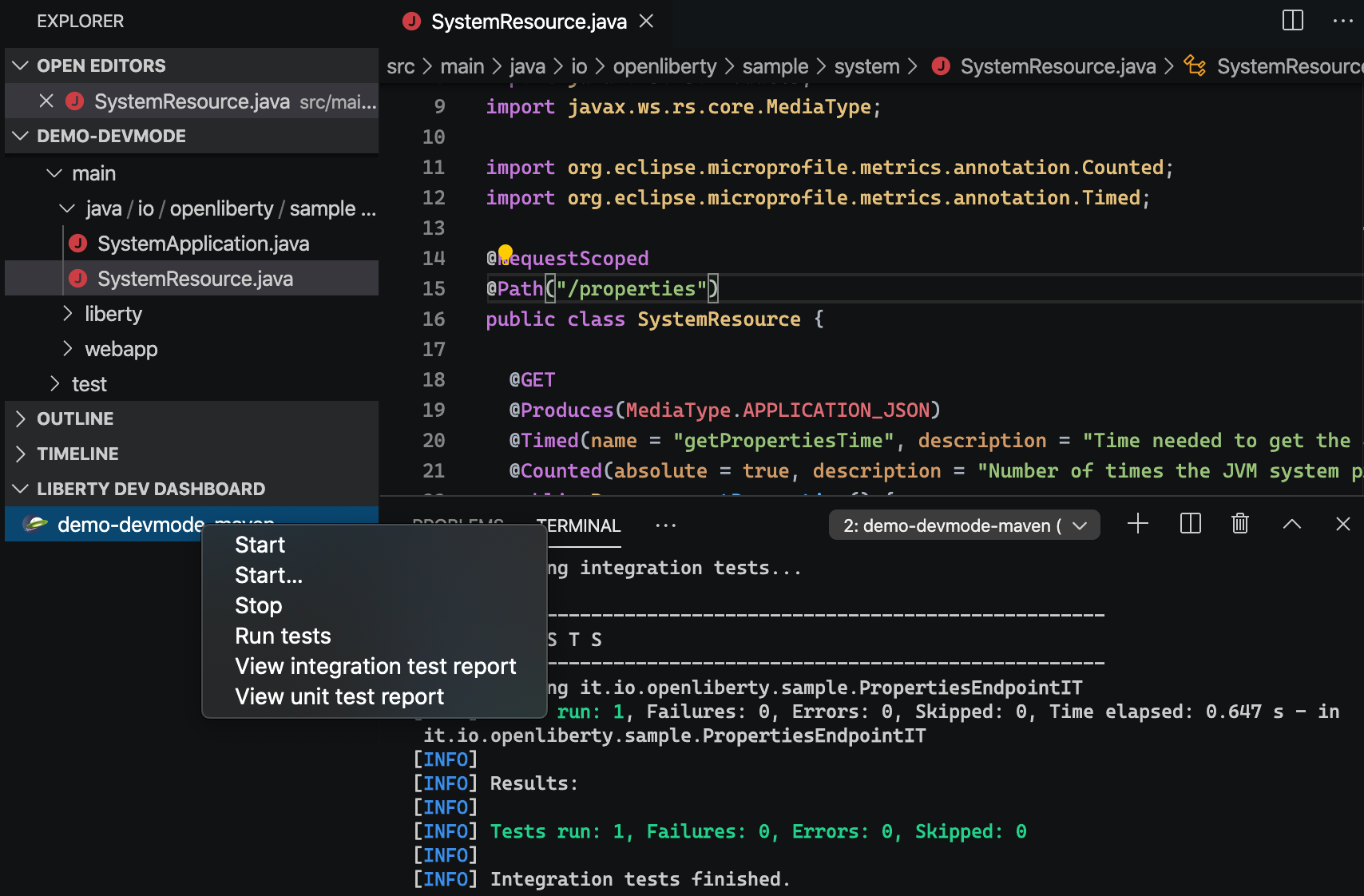A VS Code extension for Open Liberty. The extension will detect your Liberty Maven or Liberty Gradle project if it detects the io.openliberty.tools:liberty-maven-plugin in the pom.xml or io.openliberty.tools:liberty-gradle-plugin in the build.gradle. Through the Liberty Dashboard, you can start, stop, or interact with Liberty dev mode on all available Liberty Maven or Liberty Gradle projects in your workspace.
- Install the extension
- Liberty supported projects will appear in the Liberty Dashboard on the side bar
- Right-click a project in the Liberty Dashboard to view the available commands
- View supported
liberty-maven-plugin(version3.1or higher) orliberty-gradle-plugin(version3.0or higher) projects in the workspace - Start/Stop dev mode
- Start dev mode with custom parameters
- Run tests
- View unit and integration test reports
| Command | Description |
|---|---|
| Start | Starts dev mode. |
| Start… | Starts dev mode with custom parameters. Supported parameters can be found in the documentation for the dev goal of the Liberty Maven Plugin and the libertyDev task of the Liberty Gradle Plugin. |
| Start in container | Starts dev mode with the server in a container. The liberty-maven-plugin must be version 3.3-M1 or higher. The liberty-gradle-plugin must be version 3.1-M1 or higher. |
| Stop | Stops dev mode. |
| Run tests | Runs the unit tests and integration tests that are configured for your project. This command requires dev mode to be already started. |
| View integration test report | Views the integration test report file. |
| View unit test report | Views the unit test report file. |
Note: Gradle projects only have a single View test report command.
| Setting | Description | Default Value |
|---|---|---|
| liberty.terminal.useJavaHome | If this value is true, and if the setting java.home has a value, then the environment variable JAVA_HOME will be set to the value of java.home when a new terminal window is created. |
False |
The following settings provided by external extensions will be honoured when executing dev mode commands.
| Setting | Description | Provided By |
|---|---|---|
| maven.executable.path | Maven commands executed by dev mode will honour this setting. When this value is empty, it tries to use mvn or mvnw accroding to the value of maven.executable.preferMavenWrapper. |
Maven for Java extension |
| maven.executable.preferMavenWrapper | Maven commands executed by dev mode will honour this setting. If true, it tries to use mvnw if a Maven wrapper file can be found. Otherwise it will use mvn. |
Maven for Java extension |
| java.import.gradle.wrapper.enabled | Gradle commands executed by dev mode will honour this setting. If true, it tries to use gradlew if a Gradle wrapper file can be found. Otherwise it will use gradle. |
Language support for Java extension |
Contributions to the Liberty Tools extension are welcome!
Our CONTRIBUTING document contains details for submitting pull requests.
To build the extension locally:
-
git clone https://github.com/OpenLiberty/liberty-dev-vscode-ext -
cd liberty-dev-vscode-ext -
Execute
npm install -
Run the extension in Debug and Run mode by selecting
Run ExtensionorF5Alternatively, build a
.vsixfile:vsce packageto generate theliberty-dev-vscode-ext-xxx.vsixfile- Install the extension to VS Code by
View/Command Palette - Select
Extensions: Install from VSIX...and choose the generatedliberty-dev-vscode-ext-xxx.vsixfile
This follows vscode extenstion standard: add localized strings in package.nls.{locale}.json.
The default nls message file is package.nls.json.
-
Add new messages in
locales/{locale}.jsonfile. If message has parameters, use curly brackets to enclose them:{0},{1}... -
Add the following import statement in your source code:
import { localize } from "../util/i18nUtil";
-
Call method
localizeto return localized message.Example without parameters:
const message = localize("my.message.key");
Example with parameters:
const message = localize("my.message.key.with.params", param1, param2);
Please report bugs, issues and feature requests by creating a GitHub issue.

